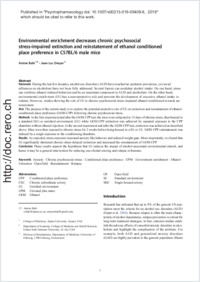Environmental enrichment decreases chronic psychosocial stress-impaired extinction and reinstatement of ethanol conditioned place preference in C57BL/6 male mice
- Bahi, Amine College of Medicine, Ajman University, Ajman, UAE - Department of Anatomy, College of Medicine and Health Sciences, United Arab Emirates University, Al Ain, UAE
- Dreyer, Jean-Luc Division of Biochemistry, Department of Medicine, University of Fribourg, Switzerland
-
30.11.2019
Published in:
- Psychopharmacology. - 2020, vol. 237, no. 3, p. 707-721
English
During the last few decades, alcohol use disorders (AUD) have reached an epidemic prevalence, yet social influences on alcoholism have not been fully addressed. Several factors can modulate alcohol intake. On one hand, stress can reinforce ethanol-induced behaviors and be an important component in AUD and alcoholism. On the other hand, environmental enrichment (EE) has a neuroprotective role and prevents the development of excessive ethanol intake in rodents. However, studies showing the role of EE in chronic psychosocial stress-impaired ethanol-conditioned rewards are nonexistent.Aim: The purpose of the current study is to explore the potential protective role of EE on extinction and reinstatement of ethanol-conditioned place preference (EtOH-CPP) following chronic psychosocial stress.Methods: In the first experiment and after the EtOH-CPP test, the mice were subjected to 15 days of chronic stress, then housed in a standard (SE) or enriched environment (EE) while EtOH-CPP extinction was achieved by repeated exposure to the CPP chambers without ethanol injection. In the second experiment and after the EtOH-CPP test, extinction was achieved as described above. Mice were then exposed to chronic stress for 2 weeks before being housed in a SE or EE. EtOH-CPP reinstatement was induced by a single exposure to the conditioning chambers.Results: As expected, stress exposure increased anxiety-like behavior and reduced weight gain. More importantly, we found that EE significantly shortened chronic stress-delayed extinction and decreased the reinstatement of EtOH-CPP.Conclusion: These results support the hypothesis that EE reduces the impact of alcohol-associated environmental stimuli, and hence it may be a general intervention for reducing cue-elicited craving and relapse in humans.
- Faculty
- Faculté des sciences et de médecine
- Department
- Département de Médecine
- Language
-
- English
- Classification
- Biological sciences
- License
-
License undefined
- Identifiers
-
- RERO DOC 327942
- DOI 10.1007/s00213-019-05408-8
- Persistent URL
- https://folia.unifr.ch/unifr/documents/308321
Statistics
Document views: 120
File downloads:
- pdf: 294
